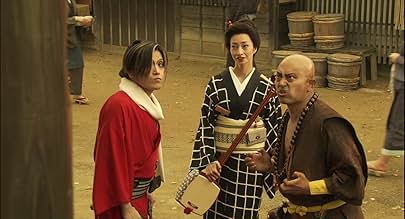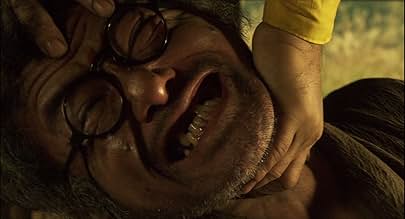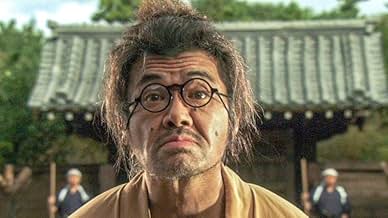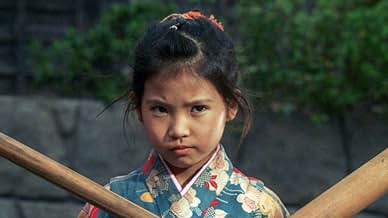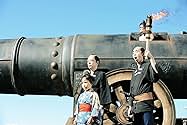ÉVALUATION IMDb
6,8/10
1,2 k
MA NOTE
Ajouter une intrigue dans votre langueA captured masterless samurai has 30 days to make a grieving boy prince smile, or he must commit seppuku.A captured masterless samurai has 30 days to make a grieving boy prince smile, or he must commit seppuku.A captured masterless samurai has 30 days to make a grieving boy prince smile, or he must commit seppuku.
- Prix
- 1 victoire et 5 nominations au total
Pistol Takehara
- Monk
- (as Kazuo Takehara)
Avis en vedette
Sayazamurai (Scabbard Samurai) was a total, pleasant surprise. It takes a while to get into the story, but those minutes of wondering "where is this movie going" are well worth it. Matsumoto (one half of the popular Downtown duo) establishes himself as a sensitive, intelligent writer/director. Fine performances all around, endearing characters, good direction, excellent production values (the story is set in the Edo era). Somewhat zany -- what else would you expect from Matsumoto? This movie really is a wonderful gem, combining laughs and some sadness. Its message of courage and love is gently conveyed. Overall, a real find for Japanese movie amateurs, a nice departure from more conventional "jidaigeki" period pieces. I definitely recommend.
A samurai gives up his sword and deserts his clan, a crime for which he is sentenced to an unusual punishment - make the morose kid of the local Lord smile in 30 days, or commit ritual suicide.
This is a film in three parts; the tonally opaque opening 20 minutes, the mid-section which is a series of comic skits as the hapless samurai (Takaaki Nomi) plugs vainly away at his task, and a final section that turns the genre slightly on its head.
The grubby, goggle-eyed Nomi is a far cry from the usual chanbara samurai. The visual predominance is kept throughout as Nomi says hardly a word in his downward spiral of diminishing dignity. Quite how he will regain that dignity is the journey of this protagonist. Sea Kumada, as his unforgiving daughter, gives a formidable performance as Tae, who excoriates her father for his failures, before rallying to his cause as he ganbarus through his thankless task. Hers will prove the most redeeming journey of all.
As you expect from Matsumoto, who is never afraid to take chances, some of the comedy works better than others. The timing is perfect and the elaborate set ups leading to brief execution and abrupt cuts away are stock of TV skit comedy here, but the transfer to the big screen works well. Three assassins brought in for, ahem, comic relief are rather flat and strained. The ending is less maudlin than it could have been, thanks to the astute reactions of Kumada.
The film is good fun with genuine laugh-out-loud moments. It has more heart than you'd expect, though the ending doesn't quite reach the heights it sets itself. It displays all the marks of Matsumoto, and fans of the Downtown star will not be disappointed.
This is a film in three parts; the tonally opaque opening 20 minutes, the mid-section which is a series of comic skits as the hapless samurai (Takaaki Nomi) plugs vainly away at his task, and a final section that turns the genre slightly on its head.
The grubby, goggle-eyed Nomi is a far cry from the usual chanbara samurai. The visual predominance is kept throughout as Nomi says hardly a word in his downward spiral of diminishing dignity. Quite how he will regain that dignity is the journey of this protagonist. Sea Kumada, as his unforgiving daughter, gives a formidable performance as Tae, who excoriates her father for his failures, before rallying to his cause as he ganbarus through his thankless task. Hers will prove the most redeeming journey of all.
As you expect from Matsumoto, who is never afraid to take chances, some of the comedy works better than others. The timing is perfect and the elaborate set ups leading to brief execution and abrupt cuts away are stock of TV skit comedy here, but the transfer to the big screen works well. Three assassins brought in for, ahem, comic relief are rather flat and strained. The ending is less maudlin than it could have been, thanks to the astute reactions of Kumada.
The film is good fun with genuine laugh-out-loud moments. It has more heart than you'd expect, though the ending doesn't quite reach the heights it sets itself. It displays all the marks of Matsumoto, and fans of the Downtown star will not be disappointed.
Saya-zamurai is a strange movie. It is, strangely, at the same time its best quality and its biggest flaw.
The beginning almost lost me: we follow a pityful character - an old samurai, with no sword and almost decaying. He is followed by a child, plus burlesque assassins, introduced in a very-tarantinesque way, and with slash of blood copied from Kill Bill. On top of that, one of the first scene with the child (fetching medicinal plant) is badly shot and looks horribly false.
I did however go on with the movie and was happy to do that. With the next part and the challenge imposed on our main character - I won't say our hero!, the movie changed its tone and become a hell lot better. Not perfect, there is a part of repetition that the director tries to mitigate but could'nt fully because of the setting of the story. There was maybe some funny scenes typically Japanese that I did not get. But that part, a bit "Kikujiro"s Kitano" inspired, in its own way, deserves your viewing, until the end twist.
That tale of the redeeming of a shameful samurai and father manages to go over the comedy (visual comedy mainly) and reach a depth I wouldn't have believed only moments before. Reflection on what is a show, it does not limit to that as it will get you emotionally involved as well.
In conclusion, this movie is full of weaknesses but still manage to propose very good parts if you let it a chance.
The beginning almost lost me: we follow a pityful character - an old samurai, with no sword and almost decaying. He is followed by a child, plus burlesque assassins, introduced in a very-tarantinesque way, and with slash of blood copied from Kill Bill. On top of that, one of the first scene with the child (fetching medicinal plant) is badly shot and looks horribly false.
I did however go on with the movie and was happy to do that. With the next part and the challenge imposed on our main character - I won't say our hero!, the movie changed its tone and become a hell lot better. Not perfect, there is a part of repetition that the director tries to mitigate but could'nt fully because of the setting of the story. There was maybe some funny scenes typically Japanese that I did not get. But that part, a bit "Kikujiro"s Kitano" inspired, in its own way, deserves your viewing, until the end twist.
That tale of the redeeming of a shameful samurai and father manages to go over the comedy (visual comedy mainly) and reach a depth I wouldn't have believed only moments before. Reflection on what is a show, it does not limit to that as it will get you emotionally involved as well.
In conclusion, this movie is full of weaknesses but still manage to propose very good parts if you let it a chance.
Director Hitoshi Matsumoto (best noted for his bizarrely funny debut, BIG MAN JAPAN) has a filmmaking approach strongly influenced by Japanese television; if film relates to his output, it's primarily through TV skits and parody. It's to our benefit that we can enjoy a film like SCABBARD SAMURAI - the story of a buffoon with coke-bottle glasses on the lam from the clan. He's forced to endure a strange punishment: he will win clemency from a local lord - if he can make his forlorn son smile.
The set-up is far-fetched, spiced up with stock characters from familiar Japanese genre films. The remainder of the film, and the scabbard samurai's life, is spent trying to come up with increasingly elaborate gags, which capture the imagination of the populace. The gags are funny in a desperate, straight faced sort of way - not unlike a Japanese Buster Keaton - making for classic physical comedy.
Matsumoto doesn't act in SCABBARD SAMURAI; instead, he relies on visual narrative and an appealing cast of supporting actors to tell its story. Some might prefer BIG MAN JAPAN with its insane special effects, but SCABBARD SAMURAI captures Matsumoto's comic talents in a plot that's engrossing and genuinely amusing.
The set-up is far-fetched, spiced up with stock characters from familiar Japanese genre films. The remainder of the film, and the scabbard samurai's life, is spent trying to come up with increasingly elaborate gags, which capture the imagination of the populace. The gags are funny in a desperate, straight faced sort of way - not unlike a Japanese Buster Keaton - making for classic physical comedy.
Matsumoto doesn't act in SCABBARD SAMURAI; instead, he relies on visual narrative and an appealing cast of supporting actors to tell its story. Some might prefer BIG MAN JAPAN with its insane special effects, but SCABBARD SAMURAI captures Matsumoto's comic talents in a plot that's engrossing and genuinely amusing.
...I watched this movie several years ago but yesterday somehow, I stumbled upon again; so I decided to put a few words about here.
All are writing about the comedy intention of the Director and how funny (or not) the movie is but that is not the main point of the story.
Is about a path to recover the Dignity in an intelligent and silly style. Persistence; Honor; Love; Solidarity; Humility and many more great Humanity values disguised as a light comedy/drama
The Zen Buddhism finale worth the watching and put many extra points to the story.
Meilleurs choix
Connectez-vous pour évaluer et surveiller les recommandations personnalisées
Détails
Box-office
- Brut – à l'échelle mondiale
- 20 251 745 $ US
- Durée1 heure 43 minutes
- Couleur
- Mixage
- Rapport de forme
- 1.85 : 1
Contribuer à cette page
Suggérer une modification ou ajouter du contenu manquant

Lacune principale
By what name was Saya-zamurai (2010) officially released in Canada in English?
Répondre
